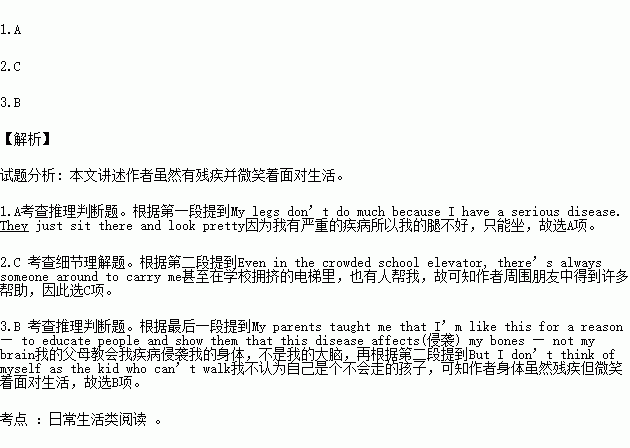题目内容
My legs don’t do much because I have a serious disease. They just sit there and look pretty. When people look at me, they only see the chair — my wheelchair. I’ve been in one since I was 3 years old. And it doesn’t matter if I graduate at the top of my class and go to law school. To some, I’ll always be the girl in the chair.
But I don’t think of myself as the kid who can’t walk. Most of my friends don’t even notice the chair anymore. I’m just the girl they’ve been friends with. My friends are good at lifting me in and out of my small car when we go to the movies. We even took the car to the dance. One of the boys helped me out of the car and all the girls helped me to fix my dress. Even in the crowded school elevator, there’s always someone around to carry me.
There are a lot of things I can’t do for myself, such as lifting my arms, dressing myself, and feeding myself. Even so, I do very well at school and I always tell myself that I’m just like any other kid in my school.
The truth is that my parents raised me to be proud of my disability(残疾). There are plenty of things I wish I could do differently. I wanted to be a doctor. But that’s not going to work out. So I’ll be a lawyer(律师) instead. I also wanted to dance and play soccer. My parents taught me that I’m like this for a reason — to educate people and show them that this disease affects(侵袭) my bones — not my brain. My friends Erica once said to me, “Kennedy, you’re not disabled. You just can’t walk.”
1.What does the underlined word “They” in the first paragraph refer to?
A. The author’s legs B. The author’s chairs
C. The author’s friends D. The author’s diseases
2.We can learn from the second paragraph that the author .
A. is the dancing queen of her school
B. is afraid of taking the school elevator
C. often gets lots of help from her friends
D. can’t be understood by her schoolmates
3.Kennedy’s story mainly tells us that we should .
A. work hard B. smile at life
C. have dreams D. thank our parents
Directions: Complete the following passage by using the words in the box. Each word can only be used once. Note that there is one word more than you need.
A. separates B. suggest C. negative D. responsibility E. failure F. willing G. control H. hold I. element J. concerned |
How do successful people think? What drives them? Interviews and investigations 1. that there are several keys to success that successful people share.
First of all, successful people never blame someone or something outside of themselves for their 2. to go ahead. They realize that their future lies in their own hands. They understand that they cannot 3. things in life, such as nature, the past and other people. But in the meantime, they are well aware that they can control their own thoughts and actions. They take 4._ for their life and regard this as one of the most empowering things they can do. Perhaps what most 5. successful people from others is that they live a life “on purpose” ---- they are doing what they believe they are put here to do. In their opinion, having a purpose in their life is the most important 6. that enables them to become fully functioning people. They 【小题7 that when they live their life on purpose, their main concern is to do the job right. They love what they do ---- and it shows. People want to do business with them because of their commitment (责任心). To live their life on purpose, successful people find a cause they believe in and create a business around it. Besides, they never easily give up. Once they have set up goals in their life, they are 7.to do whatever it takes to achieve their goals. Rather than seeing it 8. or upset they use the knowledge to encourage themselves on and go after what they want energetically and passionately.

